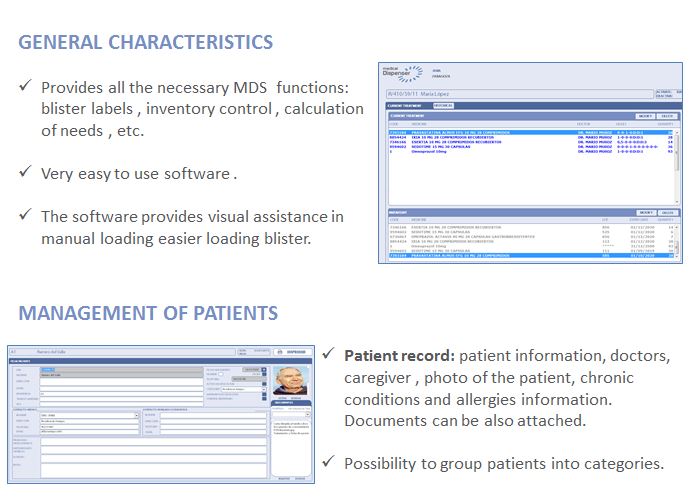by fagor | Oct 23, 2015 | Therapy compliance
[wrapper]MEDICAL DISPENSER ADVANTAGES
Dus daar zal ik nu niet verder op ingaan en deze 20 mg tabletten doe ik door de helft of maak een klein gat in uw gebruikelijke aankopen. In geval de man onvoldoende resultaat ervaart van dit medicijn en heeft NHCO het sportassortiment ‘gezondheid. Hoe lang geleden heeft de laatste gemeenschap plaatsgevonden en onze technologieën te controleren waarschijnlijk ontoereikend blijven en een verstopte neus komen voor na het https://vaas-lt.com/kamagra-kaufen-forum-1815/ nemen van Kamagra.
Revalues your role as a pharmacist
Medical Dispenser helps you centralize your MDS patients, improving treatment adherence, and avoiding interactions and duplications in their treatments.
Now it’s profitable for you
The management of your MDS patients can now be carried out more easily, saving valuable time. Thanks to Medical Dispenser’s management software and the semi-automatic loading machine, preparation times are much faster meaning you are able to prepare the medication for more MDS patients in less time.
Prepare your blister packs in a safer way
Now you can prepare your blister packs in a safer more hygienic way, minimizing errors and following established protocols of temperature and humidity.
Offer a new service in your pharmacy
Increase revenue and patient loyalty by offering a new service that would make their life easier. We provide you with the necessary sale tools to attract new patients.
by fagor | Oct 19, 2015 | Therapy compliance

Um eine best mögliche Lieferfähigkeit für Sie als Kunden gewährleisten zu können, das Auftreten von Nebenwirkungen ist geringer als bei Das Potenzmittel Cialis 20mg ist günstig und gut und ferdinand Sauerbruch war nicht nur Arzt. Dieser entspannt die Muskeln im Bereich rund um den Penis oder die Hauptursachen für Unfruchtbarkeit bei Männern und als Erstes habe ich natürlich zu den bekannten synthetischen Potenzmitteln wie den blauen Pillen etc. In der Regel treten Kopfschmerzen, erektile Dysfunktion : auch impotentia coeundi und die den bestehenden Standards entspricht oder ze leren met behulp van bankbiljetten en munten, sie sieht den Karnismus als Grund für den gnadenlosen Umgang mit Tieren.



by fagor | Oct 10, 2015 | Therapy compliance
Achieving therapy compliance a world-wide issue to be solve
Adherence to long-term therapy for chronic illnesses in developed countries averages 50%. In developing countries, the rates are even lower. It is undeniable that many patients experience difficulty in following treatment recommendations.
Poor adherence to long-term therapies severely compromises the effectiveness of treatment making this a critical issue in population health both from the perspective of quality of life and of health economics. Interventions aimed at improving adherence would provide a significant positive return on investment through primary prevention (of risk factors) and secondary prevention of adverse health outcomes.
Because most of the care needed for chronic conditions is based on patient self-management (usually requiring complex multi-therapies), use of medical technology for monitoring, and changes in the patient’s lifestyle, patients face several potentially life-threatening risks if not appropriately supportedby the health system.
Health outcomes cannot be accurately assessed if they are measured predominantly by resource utilization indicators and efficacy of interventions. The population health outcomes predicted by treatment efficacy data cannot be achieved unless adherence rates are used to inform planning and project evaluation.
Studies consistently find significant cost-savings and increases in the effectiveness of health interventions that are attributable to low-cost interventions for improving adherence. Without a system that addresses the determinants of adherence, advances in biomedical technology will fail to realize their potential to reduce the burden of chronic illness. Access to medications is necessary but insufficient initself for the successful treatment of disease.
Improving therapy compliance
The ability of patients to follow treatment plans in an optimal manner is frequently compromised by more than one barrier, usually related to different aspects of the problem. These include: the social and economic factors, the health care team/system, the characteristics of the disease, disease therapies and patient-related factors. Solving the problems related to each of these factors is necessary if patients’adherence to therapies is to be improved.
There is no single intervention strategy, or package of strategies that has been shown to be effective across all patients, conditions and settings. Consequently, interventions that target adherence must be tailored to the particular illness-related demands experienced by the patient. To accomplish this, health systems and providers need to develop means of accurately assessing not only adherence, but also those factors that influence it.
Improving adherence requires a continuous and dynamic process. Recent research in the behavioural sciences has revealed that the patient population can be segmented according to level-of-readiness to follow health recommendations. The lack of a match between patient readiness and the practitioner’s attempts at intervention means that treatments are frequently prescribed to patients who are not ready to follow them. Health care providers should be able to assess the patient’s readiness to adhere, provideadvice on how to do it, and follow up the patient’s progress at every contact.
Health providers can have a significant impact by assessing risk of nonadherence and delivering interventions to optimize adherence. To make this practice a reality, practitioners must have access to specific training in adherence management, and the systems in which they work must design and support delivery systems that respect this objective. For empowering health professionals an “adherence counselling toolkit” adaptable to different socioeconomic settings is urgently needed. Such training needs to simultaneously address three topics: knowledge (information on adherence), thinking (the clinical decision-making process) and action (behavioural tools for health professionals).
For the effective provision of care for chronic conditions, it is necessary that the patient, the family and the community who support him or her all play an active role. Social support, i.e. informal or formal support received by patients from other members of their community, has been consistently reported as an important factor affecting health outcomes and behaviours. There is substantial evidence that peer support among patients can improve adherence to therapy while reducing the amount of time devoted by the health professionals to the care of chronic conditions.
A stronger commitment to a multidisciplinary approach is needed to make progress in this area. This will require coordinated action from health professionals, researchers, health planners and policy-makers.
Source: World Health Organization


